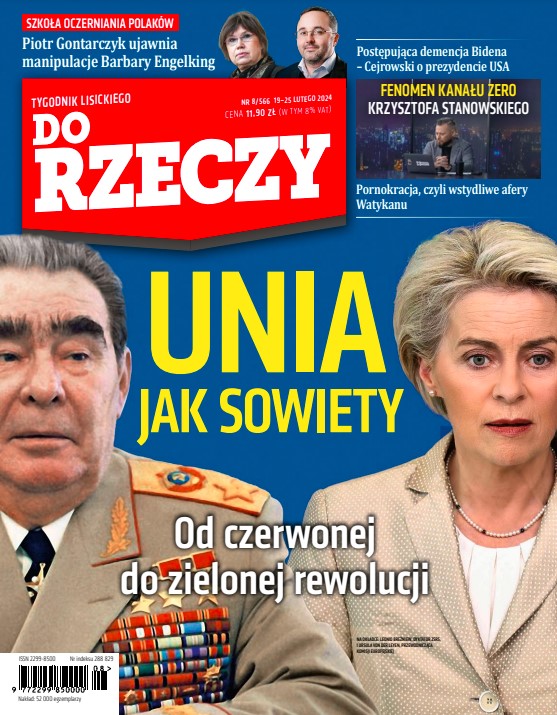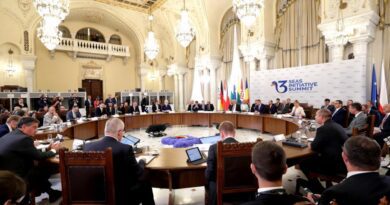The “European state”: a German clone of the USSR

Why are Poles so blind and deaf that when they see and hear such openly-proclaimed slogans, which differ from the old Soviet occupation-era rhetoric only in their new “European” terminology, they refuse to accept what they see and hear?
Rafal Ziemkiewicz
“Yesterday Moscow, today Brussels” was the battle cry raised by the right-wing parties of the time in the run-up to the referendum on Poland’s accession to the European Union in 2003. Poles did not believe them, however, and accession was approved, albeit with a low turnout (in absolute numbers, 13.5 million out of 30 million eligible voters decided that Poland should join the EU). Were they right to find the comparison between the European Union and the Soviet Union inappropriate?
Definitely yes. As initially conceived, the European Union of 2003 was still an organization of sovereign states united in a joint economic zone. Yes, even then there were voices promising great benefits if all of Europe were to become a single state in the future, with a European super-government and super-parliament, a state in which those problems that individual countries could not handle would be solved by orders coming from a higher EU level – but there was nothing yet to indicate that these ideas might be put into practice.
The situation is very different two decades later. After a series of initially minor, and then increasingly far-reaching changes – which the EU’s bureaucrats and the leaders of the bloc’s most powerful countries have secretly and systematically introduced by treating them as already accomplished facts after creating twisted interpretations of treaty provisions, circumventing them, or breaking them outright – the comparison of the EU to the collapsed USSR is valid, with the caveat that we are not talking about a resemblance to the triumphant, expansive USSR of Stalin’s or even the early Brezhnev era, but to the sclerotic Soviet Union of the late Brezhnev, Andropov, and Chernenko eras.
Polish co-rapporteur warning against European Parliament resolution on treaty reform (interview)
COLONIAL EXPLOITATION
The EU has changed. It is no longer a joint economic zone based on the principle of free movement of capital, workers, goods, and services throughout its territory, as it was when it was founded. On the contrary, the institutions created to protect the equality of competition and to act as arbiters in the disputes that are inevitable in any economic organism, having ascribed powers to themselves in excess of what the EU treaty actually provides, exploit those disputes today to overturn the original principles of European equality in the name of centrally-imposed regulations privileging the countries of the EU’s center at the expense of its periphery.
The division between the “old” and the “new” EU is thus translated into a division between privileged economies (e.g., with directives “weighting” market criteria with a “green” component) and “less green” economies (which are forced to use the technologies and products of the EU powerhouse economies).
This is nothing more than a form of colonial exploitation, analogous to the way in which, in the USSR and the “people’s democracies” that were established under its rule, all the republics and satellite states were forced to benefit from the achievements of the “leading” Soviet economy. On the other hand, when smaller countries prove capable of threatening Germany or France – in Poland’s case, the areas of such success have included trucking, specialized agriculture, and the furniture industry – then regulations, motivated either by the need to “meet climate goals” or by concern for equal social privileges for all workers, stifle that threat.
How to sell your virtue for your own dollar – EU loans for Poland unlocked for Siemens’ sake
Of course, nobody calls it by its name: exploitation. Officially, privileging the core at the expense of the periphery is supposed to “rationalize” the shared economy. When, during the Gomułka era of the 1960s, Polish engineers, who had been educated in a pre-war engineering mentality, designed Polish cars, airplanes, and the first (for the time) brilliantly innovative computers, decision-makers who were dependent on the USSR declared that there was no point in diluting the efforts of the socialist countries by focusing on their own national projects. We were told that we should concentrate on implementing the achievements of the leading Soviet science and industry.
Similar thinking can be found in the official statements of the advocates of “deepening European integration.” The German Vice-Chancellor and Minister of Economic Affairs, Robert Habeck, when recently asked about the fundamental contradiction between the plan to pump 300 billion euros into the German economy in the form of various subsidies and the basic founding principle of the EU as a community offering equal opportunities in terms of internal competition, replied: “The European economy is a whole. The EU countries do not compete with each other, they compete as Europe with China and the USA.”
Let’s think about what a fundamental change in the philosophy of the EU is hidden behind these words, especially when they are combined with the Germans’ openly-declared proposition that their prosperity is the prosperity of the whole of Europe, and that only the German economy is capable of creating such innovative technologies that will keep the old continent in the ranks of the world powers. Only Germany can manage the whole thing so well that Europe will be victorious in this league. After all, Chancellor Scholz has clarified that Germany has a historical duty to “take full responsibility for Europe,” and that the right of veto in the EU must be abolished so that smaller countries guided by their “selfish interests” do not hinder them in this great work.
It’s no longer even a question of “why do the Poles need industry when they can buy the products of German industry”; it’s in fact a statement that the economic development of Poland and other, similar “new member states” harms the community that “constitutes the unity of the European economy,” selfishly wasting resources that should be fully invested in the new generation “green” economy being created mainly by Germany and France, and thanks to which Europe will win – or at least will not be beaten too badly in competition with the United States and China.
A JUSTIFICATION OF SUPERIORITY
Why are Poles so blind and deaf that when they see and hear such openly-proclaimed slogans, which differ from the old Soviet occupation-era rhetoric that was used against them only in their new “European” them with the new “European” terminology, they refuse to accept what they see and hear? Why did they democratically elect a government that consciously and openly frames them in this discourse of Poland’s subordination within the new EU state?
The answer to this question consists of two components. The first is the ideology used to justify the construction of this European state. The Soviet Union owed its cohesion to the dominant para-religion of communism, which many believed in, especially among the classes that were privileged by the communist system. For them, uniting under Soviet leadership was a historical necessity because the state had a significant historical mission, a duty to humanity to eradicate poverty and inequality throughout the world, as well as to establish peace, universal happiness, and so on. These grand goals justified the inconveniences and sacrifices demanded of the Soviet Union’s republics.
Those politicians who seek to unite Europe into a single state have long searched for an analogous ideological bond for this new superstructure that is being built. In each successive attempt, reference has been made to that group of states which had lost world domination after two world wars but still retained the old “white man’s burden” mindset in the collective memory of the elites.
The history of European unification could be written in terms of Europe’s constant search for an excuse to cultivate its sense of superiority over the rest of the world, especially in relation its former colony, the USA, which dared to surpass it and twice played the role of hegemon, ultimately establishing the European order itself. In the pioneering days of the European Community, for example, a decision was made to focus on building a “prosperous welfare state.” Perhaps the US economy grows faster and produces more wealth, but here in Europe things are done in a fairer way, and in the long run, that counts for more. This legacy remains in the absurdly high level of benefits that the European welfare state provides and which have grown to be so crippling in the current migrant crisis, as well as in the energy crisis that is strangling the European economy, both of which are the obvious result of successive ideological follies.
The need to find reasons for European superiority – if not in an actual sense, then a “moral” one – expressed itself in various ways. At one point, for example, Europe, proud of having banned the death penalty at home, unlike the USA, obsessively enforced an analogous ban, or at least a moratorium on everyone else. It was, for example, a condition of its economic opening up to Russia – which, for the record, Russia formally met.
This need turned European politicians, especially the German ones (not coincidentally, they like to refer to today’s “European” Germany as a “moral superpower”) into exalted scouts of progress, picking up every ideological novelty from the Leftist campuses and doing their best to make the EU the “most” in the new style: the most inclusive, the most open to immigrants, and – above all – the most “climate-friendly.”
All these ideological enhancements have had a negative impact on European countries, but the latest one has taken on the dimensions of a truly Soviet madness. In the name of making Europe “the world leader in reducing greenhouse gas emissions,” the Eurocrats are ready to turn it into a ruin. But in the case of a geographical area that is responsible for only 9% of global emissions at a time when these emissions are growing everywhere else, even a complete stoppage of the economy and enforcing a ban on breathing throughout the EU would not affect the world climate.
It’s hard to resist the thought that this could only happen on a continent that for several centuries, in the late Middle Ages, persistently ruined itself in the name of liberating the Holy Sepulchre and that 110 years ago (this year in fact marks its exact anniversary) committed a spectacular self-immolation in the name of the race for overseas colonies, the long-term benefits of which were more prestigious than actual.
The ideology of “climatism” was particularly convenient for the founders of the “European state,” as it provided the best possible disguise for Germany and France’s colonialist and imperialist aspirations, and especially for the expansion of their companies. The need to reduce emissions made it possible to justify everything: why Europe should give up its own energy and become dependent on Russian gas (eventually, hydrogen), and why all industry should be converted in order to utilize green technologies. All of this was dreamed up by trusting in the conductors of this orchestra that will provide the future production capacity of the entire world. Above all, this is why it is constantly reiterated that smaller countries should stop “selfishly blocking” the great European project.
THE DEAF AND THE BLIND
The question of basing the entire European future on the mirage of green technologies, which were supposed to become the driving force of the world economy and in which Europe was supposed to force itself into a position of global leadership through severe emission reductions, leads us to the second part of the answer to the question of why so many Poles are blind and deaf to the European reality and cultivate a naive faith in the benevolent “Good ‘ol Auntie Union,” which always wants to subsidize, nanny, and protect.
It is hard to believe today that the concept of the superiority of Soviet science and civilization over the “rotten West” could have been taken seriously by anyone. We now understand this terrible idea through anecdotes, such as the silly joke popularized by Slavoj Žižek: “What is it – it doesn’t shine, and it doesn’t fit in your a..? A Soviet instrument for shining in your a…” But it was a time when Jacek Karpiński was told not to bother with his minicomputer because if it had been worth anything, it would have already been produced in the USSR (the Polish word gigantomania, meaning “gargantuanism,” did not exist at that time). Nonetheless, many believed in and insisted on this belief that the Soviet Union would reverse the course of rivers, win the space race, and lead the world in everything! Their grandchildren – often in the literal sense, as sociological patterns show that patriotic and collaborationist attitudes in Poland are primarily hereditary – stubbornly believe that the only way for Poland to modernize, civilize, and prosper is to diligently follow the orders flowing from Berlin through Brussels.
Meanwhile, contrary to the propaganda of the pro-EU elites and the current government, surrendering sovereignty to the “European state” does not mean entering an economic area managed by Bill Gates, Elon Musk, and other brilliant (whatever one may think of other aspects of their activities) innovators, but by mediocrities, party apparatchiks, and bureaucrats who will manage the future success of the “European state” as competently as those who were responsible for Gierek’s socialist “economic miracle” in the Poland of the 1970s.
Former Soviet dissident and prisoner Vladimir Bukovsky, who was very active in Poland during the campaign against EU accession that was mentioned in the introduction, repeatedly said that the EU, in the form given to it by the Left of the 1968 generation, was doomed to turn into a second USSR.
He was wrong only insofar as the ruling European Christian-social-democratic-liberal cartel – in its present form, it is merely a label devoid of its former meaning – did not repeat the path of the USSR, but cloned it. The disadvantage of cloning, which is often overlooked by the layman who succumbs to the illusion that it can guarantee immortality, is that the resulting organism has the same genetic age as the donor – and the same number of cell divisions, i.e. the same length of life ahead of it. By cloning an older adult, we don’t give him or her a new life, but we create a disabled person: a newborn older adult who is sclerotic from birth.
This is how the “motherland of the world proletariat” was reborn on the other side of the continent as the “world climate superpower.” The USSR at least managed to create a powerful army at the expense of the republics that it trampled upon, whereas attempts to create a “European army” whose priority is to make it more “climate-friendly” than others are merely grotesque.
A juggernaut state that is based on ideological delusions which contradict common sense and the laws of economics, run by mediocrities and bureaucrats who are detached from reality and who try to manage everything while being incapable of effectively managing anything, is bound to bring disaster to all who come within its reach.
So let’s stop talking about “polexit”; let’s say – “polescape.”
Time for Poland to leave the EU as rising costs now exceed benefits
This article was first published in Polish in the Do Rzeczy weekly in February 2024.



